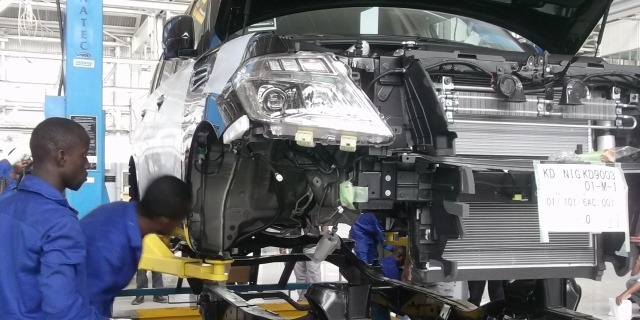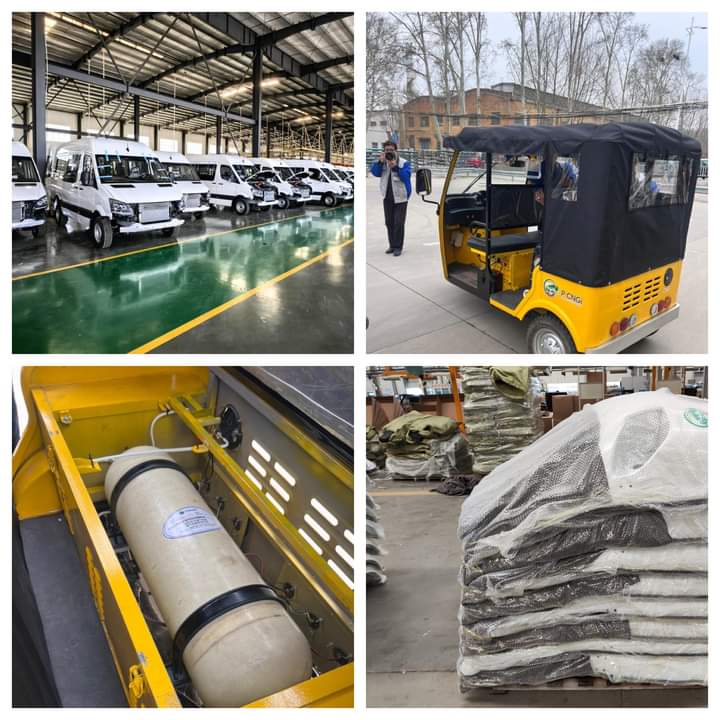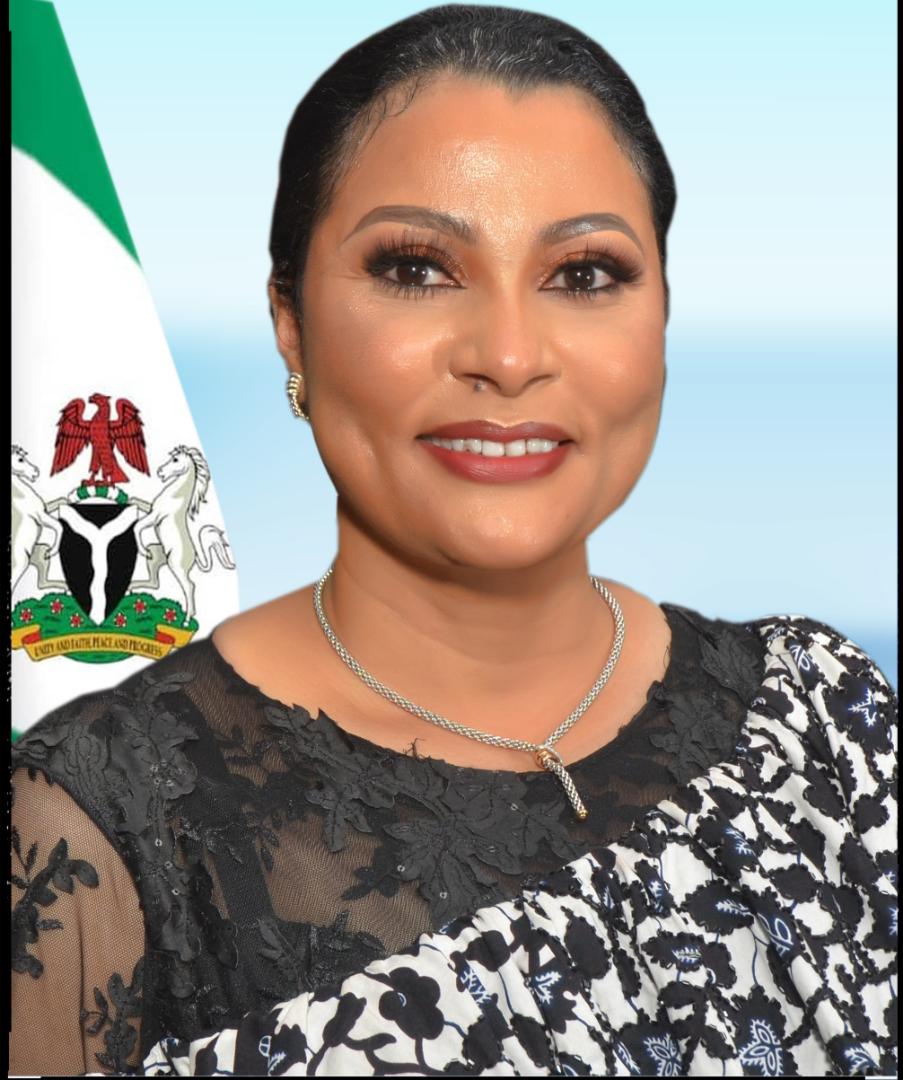Auto
‘No serious government toys with automotive industry’

- Auto policy review taking too long, BKG tells FG
Managing Director of BKG Exhibitions Limited, Mr Ifeanyichukwu Agwu, has lamented the dwindling fortunes of the Nigeria’s auto industry, noting that government must immediately focus its attention to the sector to boost the national economy.
He stated this on Wednesday at the opening ceremony of 16th edition of Lagos Motor Fair and Autoparts Expo Africa.
He underscored the importance of the auto industry to the economy of the nation and urged the Federal Government and other stakeholders to work in synergy for its accelerated development.
He stated, “The sector is very important as it shows physically the state of the economy and it generates much revenue and creates enormous employment.
“No serious government toys with it. It is a sector that affects virtually everything. If it is not rightly re-positioned now it will in the very near future negatively affect a whole lot in the life of the people and economy.”
He said this would ensure that the programme initiated about nine years ago achieve its desired goals.
The BKG MD, who is also chairman of the organising committee, Lagos Motor Fair, also called on the Federal Government to urgently come out with its promised reviewed National Automotive Industry Development Plan to reflect the realities and developments its implementation has thrown up.
He said, “We are racing against time and it does not augur well for the stakeholders, especially those that have invested billions of naira in automobile assembling/manufacture in Nigeria.”
Specifically, he suggested that the government should collaborate with the sector stakeholders to make the industry better.
“There is an urgent need for all the stakeholders to close ranks and pursue the development of the sector with more focus and dedication. They need to ensure unity of purpose and always utilize every window of opportunity such as this, to draw the attention of policy makers and implementers to the challenges in the sector,” he advised.
Agwu noted that the sector was currently facing a seriously challenging time in Nigeria, lamented that “a lot of companies have closed shop while a large number (firms) are merely existing and direly in need of life support. This can be confirmed by the number of exhibitors in this edition.
“Ordinarily, it is the delight and wish of any serious player in the industry to showcase amongst others but here we are witnessing the opposite.
“I, therefore, call on all involved to synergize by having one common front and fora where we interface with the government regularly, since it remains the biggest spender in the sector and also the policy maker and implementer. We will be able to move our business forward and better when we do this and more as developments arise.”
He stated that the BKG Exhibitions and its partners remained committed towards using this key annual event to strengthen Nigerian auto parts markets’ role as the hub of the sector’s business in Africa.
“The intention is to make players in the sector from other countries in the continent to be buying from the Nigerian markets. Nigeria has the resources and capacity to play such a role and it will be a very big disservice to Nigeria and its people if another African country does this ahead of Nigeria,” he said.
Auto
African automakers, minister, NADDC DG for June 27 Nigeria industry summit

African automakers, minister, NADDC DG for June 27 Nigeria industry summit
A delegation of the African Association of Automotive Manufacturers (AAAM) from South Africa is expected in Nigeria on June 27 this year to attend the maiden edition of the Nigeria Auto Industry Summit (NAISU).
The team will be joined by the Nigeria Association of Automotive Manufacturers (NAMA) team and other leading stakeholders to brainstorm on the sector’s development in the country and by extension Africa.
The organisers of the event, Nigeria Auto Journalists Association (NAJA), disclosed this in a statement, adding that it would be organised in partnership with the National Automotive Design and Development Council (NADDC).
Scheduled to hold at Radisson Hotel, Ikeja, Lagos, on Thursday, June 27th, 2024, the summit is envisioned as an annual flagship event of the country’s automotive industry to rally all stakeholders together to explore the great potential in the automotive sector for national development.
It said the maiden edition of the event would be declared open by the Minister of Industries, Trade and investment, Dr Doris Uzoka-Anite, under the theme ‘Reviving Nigeria’s Economy through the Automotive Sector’ .
It would have the NADDC Director General, Mr. Joseph Osannipin, as the chief host, it stated.
Commenting on the importance of the summit for the development of the country’s automotive sector, Chairman, organizing committee of NAISU, Femi Owoeye, said, “Initiating this summit is vital, especially at this moment in history, when Nigeria is struggling to map its way out of the prevailing global economic despair.
“Being one of the drivers of the global economy, the automobile industry, if given the necessary impetus in Nigeria, is capable of transforming the country to an automotive manufacturing hub in Africa.
“To this end, Nigeria Auto Industry Summit shall annually produce significant information that would help the government to make it happen.”
On his part, Chairman of NAJA, Mike Ochonma, said, “Significantly, the summit shall bridge the information and communication gap between the nation’s auto industry stakeholders and relevant government agencies.
“Moreover, annually, the summit shall give a single and united voice for the auto industry leaders to set developmental agenda aimed at kick-starting and driving relevant government policies towards a sustainable development of the automotive industry in Nigeria and ultimately position the country as a frontline beneficiary of the African Free Trade Agreement Area.”
Auto
FG to roll out 200 CNG buses, 2,500 tricycles next month

FG to roll out 200 CNG buses, 2,500 tricycles next month
- Targets one million automobiles
The Federal Government says it will unveil its first set of Compressed Natural Gas (CNG) vehicles and tricycles for mass transit next month (May 2024), as part of activities to mark President Bola Tinubu’s one year in office.
Special Adviser to the President on Information and Strategy, Bayo Onanuga, in a statement on Sunday said 200 buses and 2,500 tricycles powered by CNG would be unveiled.
He said the buses and tricycles would be rolled out with a set target of one million CNG-powered automobiles by 2027.
He said the committee led by Michael Oluwagbemi was set to deliver cheaper, safer and more climate-friendly energy vehicles.
Onanuga said the committee had fulfilled some foundational reforms to enable the new CNG and electric vehicles to deliver the future Tinubu promised.
He added that all was ready for delivery of the first set of critical assets for deployment and launch of the vehicles ahead of the first anniversary of the Tinubu administration on May 29.
Onanuga also said, “In collaboration with the private sector, the PCNGI is set to deliver 100 conversion workshops and 60 refuelling sites spread across 18 states before the end of this year.”
The Federal Government provided N100 billion, as part of the N500 billion palliative budget, to purchase 5,500 CNG vehicles, being part of the many intervention programmes to cushion the effect of increase in petrol pump price on the masses.
This included buses and tricycles, 100 electric buses and over 20,000 CNG conversion kits, with the development of CNG refilling stations and electric charging stations.
Onanuga said with necessary tax and duty waivers approved by Tinubu in December 2023, the private sector partners in the Presidential CNG Initiative (PCNGI) had responded with over $50 million investments in refuelling stations and conversion centres
He stated, “Also, a safety policy document on 80 standards and regulations that must be strictly adhered to by operators has been developed and approved to ensure CNG conversions are done safely and reliably.
“The deployment of CNG buses and tricycles and the vision to get at least one million natural gas propelled vehicles on our roads by 2027 will mark a major energy transition in our country’s transportation industry.
Onanuga also said, “Four plants owned by JET, Mikano, Mojo, and Brilliant EV located in various parts of the country are involved in the assembly of the Semi Knocked Down (SKD) components of the CNG buses.
“JET, which has received the SKD parts, is coupling the buses in Lagos and is working towards delivering 200 units before the first anniversary of the Tinubu administration.
“Brilliant EV will assemble electric vehicles. It is awaiting the SKD parts, which will arrive in due course. The electric vehicles it will produce are meant for states, such as Kano and Borno, which do not have access to CNG for now.
“They will also be available in key Nigerian cities and university campuses.
“It must be noted that soon to be completed gas pipeline projects initiated by the Buhari administration and being completed by NNPCL (the AKK Pipeline) will take gas into the hinterlands of North-East and North-West where there is current paucity.”
He said over 600 buses were targeted for production in the first phase this year while a new plant on the Lagos-Ibadan Expressway would assemble thousands of tricycles.
“The SKD parts manufactured by the Chinese company LUOJIA in partnership with its local partner to support the consortium of local suppliers of CNG tricycles are set for shipment to Nigeria and expected to arrive early in May. About 2,500 of the tricycles will be ready before May 29, 2024.
“Thousands of conversion kits for petrol powered buses and taxis that want to migrate to CNG are also ready with CNG cylinders.
“The Federal government intends to provide them at subsidised rates, especially to commercial vehicle drivers to bring down the cost of public transportation.”
As part of private sector collaboration, NIPCO and BOVAS are involved in offering refilling services for the CNG vehicles and also serving as conversion centres.
NIPCO is setting up 32 stations nationwide to offer the services. The company has completed the set-up of four of the CNG stations.
“Likewise, BOVAS is setting up eight stations in Ibadan, two each in Ekiti, Abuja and four in Ilorin.
“MRS is also involved. It is making efforts to announce where its refilling stations and conversion centres will be,” Onanuga added.
He also said NNPC Limited, which had launched an on-and-off CNG initiative in the past, was joining the new initiative and expected to announce the locations for CNG refilling and CNG conversion centres nationwide.
The statement said PCNGI was working with 22 other agency-partners, including the Standards Organisation of Nigeria (SON) and National Automotive Design and Development Council, to deliver 80 Natural Gas Vehicle Conversion and Associated Appliances Standards for the country.
He added that the vision of the President to deliver one million gas vehicles could not be possible without the private sector, including the RTEAN, NURTW and players in the downstream sector of the transportation chain and financiers.
Auto
We expect massive roll-outs of Nigeria-made cars by December 2024 – Minister

We expect massive roll-outs of Nigeria-made cars by December 2024 – Minister
Nigeria now has the capacity and materials to manufacture made-in-Nigeria cars for local use and export, the Federal Government has said.
Minister of Industry, Trade and Investment, Dr Doris Uzoka-Anite, stated this at the Automotive Component Manufacturers meeting in Abuja.
She said local manufacturers should be be held responsible if they fail to deliver massively Nigeria-made cars at the end of this year.
The minister said notwithstanding challenges facing the nation’s automobile industry, with the enabling environment being provided by the government, manufacturers should be held responsible if the cars are not rolling out by December 2024.
Newstrends reports a total of 37 firms were licensed automobile manufacturers/assemblers in Nigeria as of March 2023.
This figure is contained in the NADDC Updated List of the Accredited Locally Manufactured Brand in Nigeria.
Nigeria is said to currently produce less than 10 per cent of the 400,000 vehicles being used in the country.
The minister said, “As far as we are concerned, the auto industry is now set to go. We are counting on all stakeholders to make that happen.
“If we do not produce made-in-Nigeria cars before the end of this year (December), it will be your fault, because I am sitting down here giving you all the assurances that this administration has created the enabling environment to make sure that the auto policy kicks off.”
A statement by the ministry’s Director of Information and Public Relations, Adebayo Thomas, said the minister emphasised the need for collaboration among manufacturers, dealers, regulatory bodies and other players in the automobile industry.
She stressed that by working together, they could address challenges, streamline processes and drive innovation.
Even as she emphasised the need for local content, she urged stakeholders to maintain high-quality standards in vehicle manufacturing, safety features, emissions control and after-sale services.
This, she said, would boost consumer confidence and attract investment.

-

 Education4 days ago
Education4 days agoWhy we charge N42m fees for primary school pupils — Charterhouse Lagos
-

 News6 days ago
News6 days agoUpdated: More trouble for Yahaya Bello as Immigration places him on watch list
-

 Auto4 days ago
Auto4 days agoWe expect massive roll-outs of Nigeria-made cars by December 2024 – Minister
-

 International6 days ago
International6 days agoUpdated: Tragedy hits Kenya, Defence chief, nine others die in military helicopter crash
-

 metro4 days ago
metro4 days agoJUST IN : Borrow pit collapses, kills seven Qur’anic school pupils
-

 News4 days ago
News4 days agoWe’re not part of Yoruba Nation agitation, says MKO Abiola family
-

 metro2 days ago
metro2 days agoHow gunmen killed Babcock university lecturer, abducted two – Police
-

 News7 days ago
News7 days agoYahaya Bello: EFCC warns against obstruction of operations






















